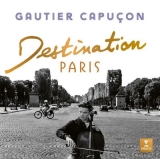Schon das Beiheft zeigt, dass es sich um ein Wohlfühlalbum handelt. Musikerfotos, vor allem von Gautier Capuçon, füllen die Seiten. Neben technischen Daten gibt nur ein Grußwort des Cellisten und Informationshäppchen.
22 für das Cello und die Begleiter arrangierte Stücke vom Barock über Oper bis hin zu Chanson und Film bieten über Musikgeschichte und Stile hinweg einen Ohrenschmaus.
Dabei entwickeln die Involvierten die Musik mit einem durchgestalteten und eher aus einer kammermusikalischen Sicht kommenden Ansatz. Platt lauthals aufspielende Momente bleiben zum Glück aus. Intensität und Dichte gibt es allerdings schon.
Die Interpreten finden immer das richtige Rezept. Manchmal hat man den Eindruck, dass sogar die Technik Klangpatina aufgetragen hat, um ein Zeitgefühl zu vermitteln. Alle Stücke werden mit geschmeidiger Hand und doch auch spielerisch zuverlässiger Manier zubereitet.
Musizierfreude wird immer deutlich, etwa auch bei Pense à nous von Jean-Jacques Goldman. Hier singt der Kinderchor Maîtrise de Radio France zum Celloklang mit unbeschwertem frischem Geist. Im sich anschließenden Chi mai von Ennio Morricone aus dem Film Der Profi wiegen sich die Musiker gelöst im unschuldig anmutenden Takt. Die danach folgende Pavane pour une infante défunte von Maurice Ravel führt dann kurzfristig wieder auf klassische Spur.
Man muss für das Programm schon auch Freude am französischen Musikstil haben. Gerade die weniger klassischen Beiträge haben eben das bestimmte Flair, dem man gewogen sein muss, um es uneingeschränkt über die gesamte Strecke genießen zu können.
Die Fragen, ob solche Häppchen allein satt machen und wie gesund sie sind, mag jeder für sich entscheiden. Aber wie das bei süchtig machenden Petits Fours so ist, man kann einfach nicht widerstehen. Man nascht, bis der Teller leer ist. Und dann möchte man neu auflegen und von vorne anfangen.
Even the booklet shows that this is a feel-good album. Musician photos, especially of Gautier Capuçon, fill the pages. Besides technical data, only a greeting from the cellist provides tidbits of information.
22 pieces arranged for the cello and accompanists from baroque to opera to chanson and film offer a feast for the ears across music history and styles.
In the process, those involved develop the music with a well-designed approach that comes more from a chamber music perspective. Fortunately, there are no flat, loud moments. However, there is intensity and density.
The performers always find the right recipe. Sometimes one has the impression that even the technique has applied sound patina to convey a sense of time. All pieces are prepared with a supple hand and yet also playfully reliable manner.
Joy of music-making is always evident, for example in Pense à nous by Jean-Jacques Goldman. Here the children’s choir Maitrise de Radio France sings to the cello sound with a light-hearted fresh spirit. In the following Chi mai by Ennio Morricone from the film The Professional, the musicians sway loosely in the seemingly innocent beat. The following Pavane pour une infante défunte by Maurice Ravel then briefly takes us back on the classical track.
You have to enjoy the French style of music for the program. Especially the less classical contributions have a certain flair, which you have to like in order to be able to enjoy it unrestrictedly over the whole distance.
The questions of whether such morsels alone make you full and how healthy they are may be decided by everyone for themselves. But as is the case with addictive petits fours, you just can’t resist. You snack until the plate is empty. And then you want to start all over again.
























